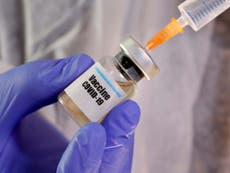Children will not be among first to receive initial Covid-19 vaccine, CDC says
Several drugmakers in final trial phases as race for coronavirus vaccine underway
Your support helps us to tell the story
From reproductive rights to climate change to Big Tech, The Independent is on the ground when the story is developing. Whether it's investigating the financials of Elon Musk's pro-Trump PAC or producing our latest documentary, 'The A Word', which shines a light on the American women fighting for reproductive rights, we know how important it is to parse out the facts from the messaging.
At such a critical moment in US history, we need reporters on the ground. Your donation allows us to keep sending journalists to speak to both sides of the story.
The Independent is trusted by Americans across the entire political spectrum. And unlike many other quality news outlets, we choose not to lock Americans out of our reporting and analysis with paywalls. We believe quality journalism should be available to everyone, paid for by those who can afford it.
Your support makes all the difference.Vaccines for the coronavirus may not be recommended to children when they first become available, according to the Centers for Disease Control and Prevention.
The agency said on Wednesday that drugmakers have tested potential Covid-19 vaccines – of which there are several in trial phases – on non-pregnant adults. Trials are expected to expand to other groups, but it’s unclear when those phases would begin, the CDC said.
“Clinical trials continue to expand those recruited to participate,” the agency said on its website. “The groups recommended to receive the vaccines could change in the future.”
AstraZeneca, among one of the drug manufacturers with a likely vaccine candidate, said it would begin testing children in a second trial phase.
Moderna, also testing another possible candidate, could begin testing children later this year.
In an update outlining US vaccine planning, the CDC said that “there may be a limited supply of Covid-19 vaccines before the end of 2020, but supply will continually increase in the weeks and months that follow.”
The timeline undermines Donald Trump’s repeated assertion that a vaccine would be readily available by Election Day on 3 November, or by the end of the year.
At least 7.9 million Americans have been infected with the disease since the outbreak began, and more than 213,000 Americans have died, according to Johns Hopkins University.
"The goal is for everyone to be able to easily get a Covid-19 vaccine as soon as large quantities are available," the agency said. “The plan is to have several thousand vaccination providers available so no one will have to travel far to be vaccinated, whether it’s at your doctor’s office, retail pharmacy, hospital, or federally qualified health center.”
Cost of a vaccine “will not be an obstacle,” the agency said.
“The federal government is committed to providing free or low-cost” vaccines, and doses purchased with US taxpayer dollars “will be given to the American people at no cost,” the agency said
“However, vaccine providers will be able to charge administration fees for giving or administering the shot to someone,” the CDC said. “Most public and private insurance companies will cover that fee so there is no cost for the person getting vaccinated. In addition, people without health insurance can get Covid-19 vaccines at no cost.”
Once a vaccine is authorised, the National Academies of Sciences, Engineering, and Medicine and Advisory Committee on Immunization Practices will make recommendations “on how to distribute these limited vaccines in a fair, ethical, and transparent way,” according to the CDC.
A vaccine would be distributed in four phases – heath workers, older people and people with underlying health conditions will have first access to a vaccine, followed by teachers, people serving homeless shelters and people in prisons, according to guidance from the National Academies of Sciences, Engineering and Medicine.
As researchers race for a vaccine under the Trump administration’s Operation Warp Speed programme, several drugmakers have suspended their trials following reports of an “unexplained illness" among patients.
American drugmaker Johnson & Johnson announced on Monday that it had “temporarily paused” its third phase trial “due to an unexplained illness in a study participant.” It began its third and final phase of testing on 22 September.
“It may have nothing to do with the vaccine”, Mathai Mammen, head of research and development for Janssen, Johnson & Johnson's medicine development business, said on Tuesday.
Last month, British drug-maker AstraZeneca also temporarily stopped its phase three trial after a patient developed inflammation in her spine. The trial has since restarted in several countries.
American pharmaceutical company Eli Lilly, also backed by the Operation Warp Speed initiative, recently suspended its ACTIV-3 monoclonal antibody trial “out of an abundance of caution."
On Tuesday, the company announced: “Safety is of the upmost importance to Lilly. We are aware that, out of an abundance of caution, the ACTIV-3 independent data safety monitoring board (DSMB) has recommended a pause in enrolment.”





Join our commenting forum
Join thought-provoking conversations, follow other Independent readers and see their replies
Comments